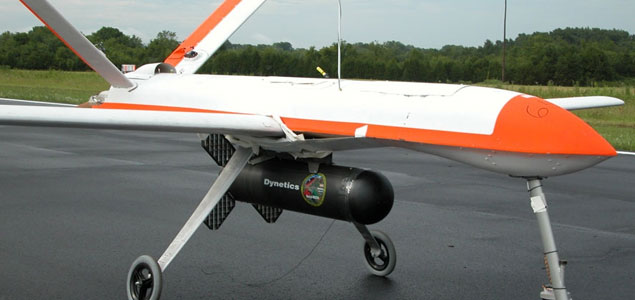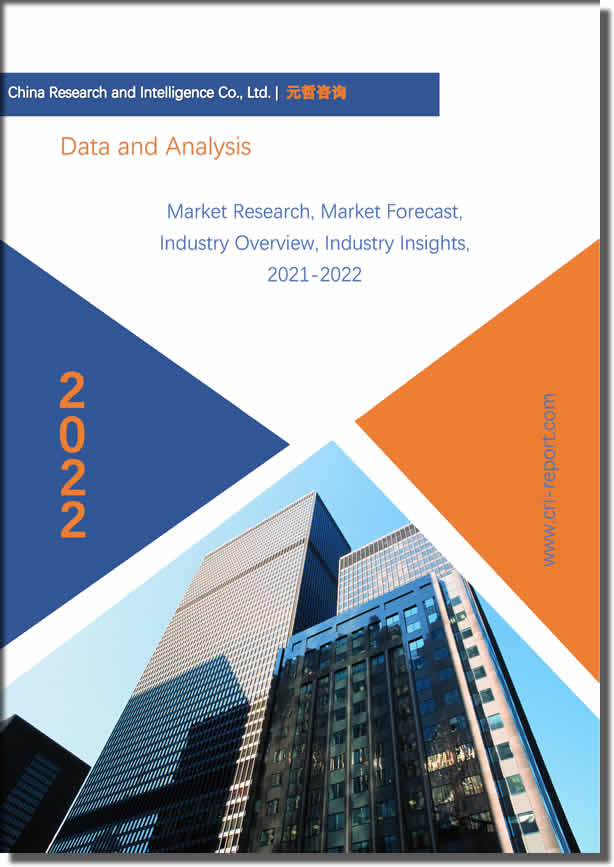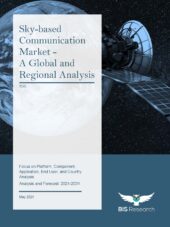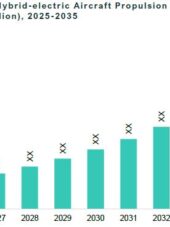Description
Global Remote Drone Identification System Market Overview
The global remote drone identification system market was valued at $2.8 million in 2021, and it is expected to reach $4.0 million by 2032, growing at a CAGR of 3.5% during the forecast period 2022-2032. The growth in the global remote drone identification system market is expected to be driven by the enforcement of remote drone identification system regulation and an increase in the number of drones.
Market Lifecycle Stage
 In the past decade, the number of drones has increased drastically due to their wide applications, such as entertainment, cargo delivery, hobby, mapping, surveying, and inspection. Since the number of drones is increasing drastically and the drone market is getting matured worldwide, regulatory agencies are focused on developing a framework to track and monitor drone activities.
In the past decade, the number of drones has increased drastically due to their wide applications, such as entertainment, cargo delivery, hobby, mapping, surveying, and inspection. Since the number of drones is increasing drastically and the drone market is getting matured worldwide, regulatory agencies are focused on developing a framework to track and monitor drone activities.
This will help the industry to enhance its operations beyond the visual line of sight and fly over people during certain events and parties. In addition, due to the increase in the number of drones, the traffic in the airspace is also expected to grow drastically, which will lead to drone collisions or accidents.
In order to keep the airspace safe and secure, it is mandatory to track the activities of drones and their operators.
To track drones, the regulatory agencies have come up with a solution known as a remote drone identification system, which will broadcast information such as drone identification (ID), drone location and altitude, drone velocity, control station location and elevation, time mark, and emergency status, which will help the government entities and security agencies to monitor drones and file case activities against the operator if they are flying illegally.
This will reduce the cost and time for the government entities to conduct an investigation and find the anti-social elements quickly.
In addition, the remote drone identification system manufacturers have developed modules by integrating both broadcast-based (Bluetooth and Wi-Fi) and network-based (4th generation (4G), global system for mobile communications (GSM), and long-term evolution (LTE)) technologies to broadcast information.
This might help them to sell the modules and capture the market across the world that uses broadcast-based and network-based remote identification technology.
Impact
The global remote drone identification system market is observing rising investment across all the drone platforms, which drives the investments across the remote drone identification technology. The major challenge in developing remote identification technology is that there is no clear regulatory guidance on which technology to use to broadcast information.
This leads the developer to integrate both broadcast and network-based technologies in the remote drone identification system, which increases the price of the system. In addition, the regulatory agencies have pushed the dates for making remote identification technology mandatory across all drones’ platform which again creates unnecessary confusion in the market.
This results in a sudden increase in demand for remote identification technology, which again results in an increase in the price of the remote drone identification system due to less supply.
Market Segmentation
Segmentation 1: by Drone Type
• Fixed Wing
• Rotary Wing
Based on drone type, the global remote drone identification system market is expected to be dominated by the rotary wing segment during the forecast period 2022-2032.
Segmentation 2: by End User
• Commercial
• Government
• Military
Based on end user, the global remote drone identification system market is expected to be dominated by the commercial segment.
Segmentation 3: by Identification Technology
• Broadcast-Based Technologies
o Automatic Dependent Surveillance-Broadcast (ADS-B)
o Low Power Direct Radio Frequency (RF)
o Unlicensed Integrated C2
• Network-Based Technologies
o Network Cellular
o Satellite-Based UAS Communication
o Software-Based Flight Notification
The broadcast-based technology segment had the highest market share in 2021. The remote drone identification system market (broadcast-based technology) reported $80.0 million in revenue in 2021 and is expected to grow at a CAGR of 4.2% during the forecast period 2022-2032.
Segmentation 4: by Region
• North America – U.S. and Canada
• Europe – France, Germany, U.K., and Rest-of-Europe
• Asia-Pacific – China, Japan, India, and Rest-of-Asia-Pacific
• Rest-of-the-World – Middle East and Africa, and South America
Globally, North America is one of the most prominent regions which is exponentially progressing in the remote drone identification system market.
Recent Developments in the Global Remote Drone Identification System Market
• In August 2022, INVOLI launched a new generation drone tracker, the LEMAN RemoteID, which allows drone operators to fly safely and according to regulations around the world. In addition, the device complies with the latest regulations and bears the Conformité Européenne (CE)/Federal Communications Commission (FCC) labels.
• In July 2022, AIRmarket Inc. partnered with Petroleum Technology Alliance Canada (PTAC) and successfully conducted a beyond visual line of sight (BVLOS) drone flight with the help of unmanned traffic management (UTM) for the Energy UTM Trials under the Digital Innovation in Clean Energy (DICE) program at the Suncor Fort Hills Mine near Fort McMurray, Alberta.
• In May 2022, Aloft Technologies, Inc. launched a new portal Aloft Geo Portal, which is a free tool to publish ground and airspace rule advisories to the Aloft data network, including B4UFLY. In addition, it fills the gap in integrating the drone and the lack of authoritative sources for local drone ground rules.
• In April 2022, Auterion Ltd. partnered with Elsight Limited to integrate Halo with Skynode due to its lightweight and small form factor, which provides ultra-reliable cellular connectivity across different carrier networks.
• In March 2022, Unifly nv partnered with ORKID for the safe and secure integration of drones in Colombian airspace and successfully conducted BVLOS missions through Unifly’s unmanned traffic management technology.
• In February 2022, Dronetag s.r.o. launched a small and affordable remote ID device, Dronetag Mini, which has a long-lasting battery life of up to 14 hours for all drones.
Demand – Drivers and Limitations
Following are the drivers for the global remote drone identification system market:
• Need for Enabling Night and Overhead Operations
• Future Regularization of Expanded Operations
Following are the challenges for the global remote drone identification system market:
• Inadequate Supply for the Sudden Demand
• Unclear Regulations and Standards
Following are the opportunities for the global remote drone identification system market:
• Opportunity for Drone Remote ID Manufacturers
• Opportunity for UTM Platform Developers
• Opportunity for Drone-Based Service Providers
• Opportunity for Organizations with Accessible Free Fly Zones
How can this report add value to an organization?
Platform/Innovation Strategy: The product segment helps the reader understand the different types of remote drone identification technologies in the industry to conduct safe and secure beyond visual line of sight operations in cities and urban areas. Moreover, the study provides the reader with a detailed understanding of the different remote drone identification technologies based on broadcast-based technologies, and based on network-based technologies.
Growth/Marketing Strategy: The global remote drone identification system market has seen major development activities by key players operating in the market, such as business expansion activities, contracts, mergers, partnerships, collaborations, and joint ventures. The favored strategy for the companies has been contracts to strengthen their position in the remote drone identification system market.
For instance, in August 2022, INVOLI partnered with AIRmarket Inc. to deploy the INVOLI receivers on the first segment of the energy unmanned traffic management (UTM) trials to provide surveillance for cooperative air traffic. Furthermore, in June 2022, Unifly nv signed a partnership with Odense University Hospital (OUH) to provide unmanned traffic management to transport blood and medicine through drones faster and safely.
Competitive Strategy: Key players in the global remote drone identification system market analyzed and profiled in the study involve remote drone identification system manufacturers that offer broadcast-based and network-based remote identification technologies.
Moreover, a detailed competitive benchmarking of the players operating in the global remote drone identification system market offers various solutions to track and monitor drones using drone detection technologies and software-based flight notification systems.
Additionally, comprehensive competitive strategies such as contracts, partnerships, agreements, acquisitions, and collaborations will aid the reader in understanding the untapped revenue pockets in the market.
Key Market Players and Competition Synopsis
The companies that are profiled have been selected based on inputs gathered from primary experts and analysis of the company’s coverage, product portfolio, and market penetration.
Some prominent established names in this market are:
Company Type 1: Remote Identification System Providers
• AirMarket Inc.
• Aerobits Sp. z o.o.
• Auterion Ltd.
• Dronetag s.r.o.
• Elsight Ltd.
• FLARM Technology Ltd.
• INVOLI
• ScaleFlyt
• uAvionix
• Unifly nv
Company Type 2: Drone Detection Companies
• AirMap Inc.
• Aloft Technologies, Inc.
• ANRA Technologies
• DroneShield Ltd
• RelmaTech
Companies that are not a part of the previously mentioned pool have been well represented across different sections of the report (wherever applicable).






Reviews
There are no reviews yet.